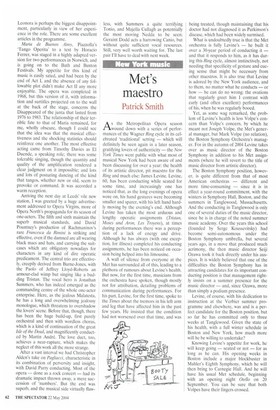Met's maestro
Patrick Smith
As the Metropolitan Opera season wound down with a series of performances of the Wagner Ring cycle in its celebrated 'traditional' setting — which will definitely be seen again in a later season, gratifying lovers of authenticity — the New York Times went public with what most of musical New York had been aware of and been discussing for over a year: the health of its artistic director, pit maestro for the Ring and much else: James Levine. Levine, 60, has been conducting while seated for some time, and increasingly one has noticed that, as the long evenings of opera wore on, his hand gestures were becoming smaller and sparer, with his left hand hardly moving by the evening's end. Although Levine has taken the most arduous and lengthy operatic assignments (Tristan, Moses und Aron, Les Troyens), at times during performances there was a perception of a lack of energy and drive. Although he has always (with one exception, for illness) completed his conducting assignments, he has been noticed on occasion being helped into his limousine.
A wall of silence from everyone at the Met has surrounded all of this, leading to a plethora of rumours about Levine's health. But now, for the first time, musicians from the orchestra have spoken, though mostly not for attribution, detailing problems of communication during performances. For his part, Levine, for the first time, spoke to the Times about the tremors in his left arm and leg that have affected him in the past few years. He insisted that the condition had not worsened over that time, and was
being treated, though maintaining that his doctor had not diagnosed it as Parkinson's disease, which had been widely surmised.
What is undoubtedly true is that the Met orchestra is fully Levine's — he built it over a 30-year period of conducting it — and that it responds to him, as it has during this Ring cycle, almost instinctively, not needing that specificity of gesture and cueing sense that might be necessary from other maestros. It is also true that Levine is adored by the New York audience, and to them, no matter what he conducts — or how — he can do no wrong: the ovations that regularly greet him I contrast with early (and often excellent) performances of his, when he was regularly booed.
Yet, as some wag remarked, the problem of Levine's health is less Volpe's concern than Volpe's concern, by which he meant not Joseph Volpe, the Met's general manager, but Mark Volpe (no relation), the Boston Symphony Orchestra's manager. For in the autumn of 2004 Levine takes over as music director of the Boston Symphony in addition to his Met assignments (where he will revert to the title of music director from artistic director).
The Boston Symphony position, however, is quite different from that of most American orchestras — different and more time-consuming — since it is in effect a year-round commitment, with the winters in Symphony Hall, Boston, and the summers in Tanglewood, Massachusetts. And the conducting in Tanglewood is only one of several duties of the music director, since he is in charge of the noted summer music academy. Over the years this school (founded by Serge Koussevitsky) had become semi-autonomous under the Boston Symphony umbrella, but several years ago, in a move that produced much acrimony, the then music director Seiji Ozawa took it back directly under his auspices. It is widely believed that one of the difficulties the Boston Symphony has in attracting candidates for its important conducting position is that management rightly insists on a summer presence for the music director — and, since Ozawa, more than simply a podium presence.
Levine, of course, with his dedication to instruction at the Verbier summer programme and elsewhere, was and is a perfect candidate for the Boston position, but so far he has committed only to three weeks at Tanglewood. Given the state of his health, with a full winter schedule in Boston and New York, how much more will he be willing to undertake?
Knowing Levine's appetite for work, he will keep going — seated or not — for as long as he can. His opening weeks in Boston include a major blockbuster in Mahler's Eighth Symphony, which he will then bring to Carnegie Hall. And he will have his usual Met schedule, beginning with an opening night Otello on 20 September. You can be sure that both Volpes have their fingers crossed.


















































































 Previous page
Previous page